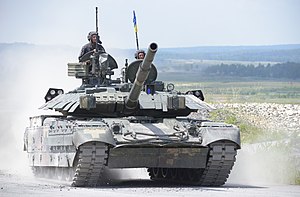Psrvn 99
Jump to navigation
Jump to search
This article is incomplete because it is pending further input from participants, or it is a work-in-progress by one author. Please comment on this article's talk page to share your input, comments and questions. Note: To contribute to this article, you may need to seek help from the author(s) of this page. |
| Panssarivaunu 99 | |
|---|---|
 A Psrvn 99. | |
| Type | Main battle tank |
| Place of origin | |
| Service history | |
| Used by | |
| Production history | |
| No. built | 1,450+ |
| Specifications | |
| Weight | 46 tonnes |
| Length | 7.086 metres (Total) |
| Width | 3.775 meters |
| Height | 2.215 meters |
| Crew | 3 |
| Armor | Steel and composite armour with ERA |
Main armament | PaK 70U 125 mm smoothbore gun with ATGM capability |
Secondary armament | 12.7 mm Kvkk 98 |
| Engine | Diesel Engine 1200 hp |
| Suspension | Torsion-bars, hydraulic dampers |
Operational range | 540 km |
| Speed | 65 km/h |
The Panssarivaunu 99 is a main battle tank developed by the Aitic Federation as an extensive upgrade of the Psrvn 76. It serves as the primary battle tank of the Aitic Federation, alongside the Psrvn 73 and 93. Despite the Psrvn 93 being of similar or superior capabilities, the Psrvn 99 was chosen as the next generation Aitic main battle tank due to a significantly lower cost in manufacturing.
Development
Production history
Service History
Combat history
Design
Armament
Mobility
Protection
Variants
Domestic Variants
- Psrvn 99M1: The first model of Psrvn 99, essentially a Psrvn 73 with a new diesel engine, turret and new electro-optical active protection systems, as well as improved electronics.
- Psrvn 99TL: The main model in current service, the TL upgrade of 2002 survivability is enhanced with a new laser warning system integrated with a series of smoke grenade dischargers on each side of turret, a new fire suppression system, REDA NBC suite and electromagnetic mine plow. The most important improvement in firepower comes from the use of an upgraded computerized FCS which enables a "hunter-killer" mode of operation; the commander has a panoramic day/night sight with built-in laser rangefinder and thermal camera and can engage targets independently, while the gunner has his own primary sight with thermal channel. The FCS has sensors that correct for thermal distortion of the barrel, the temperature of the ammunition propellant, meteorological conditions, totaling 22 sensor clusters installed at several points on the turret.
- Psrvn 99U: Further development introduced in 2010. Upgrades include improved armor, a new panoramic tank sight. The electro-optical active protection system has been upgraded and some models include a further powered 1500hp engine.
